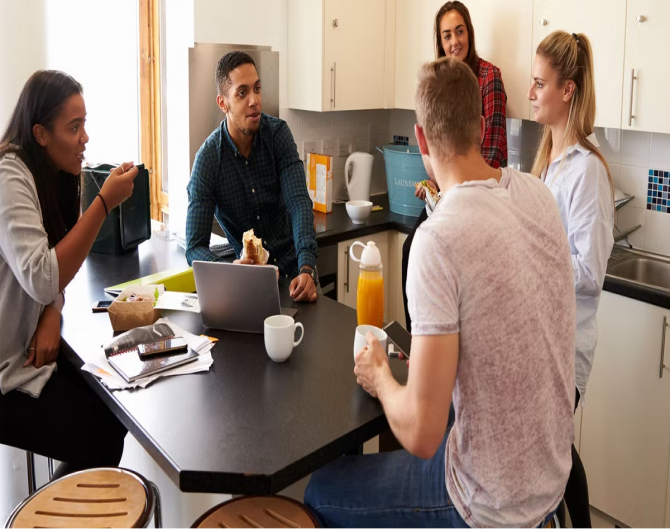

From Arrival to Graduation: Student Life in Edinburgh for International Students
Thinking about moving to Edinburgh for university? You're not alone, and for good reason. Edinburgh isn’t just another university city; it’s a buzzing hub of culture, history, and student energy. With world-class education, endless things to do, and a skyline that looks like it belongs in a fantasy novel, it’s no surprise so many students from around the world end up falling in love with it.
But there’s more to student life here than castles and cobbled streets. Finding the right student accommodation in Edinburgh, adjusting to the local lifestyle, and figuring out how to thrive in a new environment can be a challenge, especially if you’re arriving from overseas.
This guide pulls back the curtain on what living and studying in Edinburgh is really like. From the social scene to the daily realities, it’s everything students wish they’d known before making the move.
TL;DR – Is Edinburgh Good for International Students?
The Good Stuff:
- Top-ranked universities with global recognition
- Beautiful, historic city with loads to explore
- Friendly, welcoming locals
- Rich cultural scene, festivals, museums, art, music
- Safe and student-friendly environment
- Lively nightlife and strong student community
The Tough Bits:
- High cost of living (£200-£450 per week)
- Unpredictable weather (prepare for all seasons in a day)
- Finding accommodation can be competitive and stressful
- It can take time to adjust to a new culture and pace
The Bottom Line:
Most international students love living in Edinburgh. It offers that rare mix of top-tier education and a genuinely exciting student life.
Why International Students Pick Edinburgh
1. Universities That Actually Open Doors
Edinburgh's education reputation isn't just hype. These degrees get you places worldwide. Your options include a mix of traditional and career-focused institutions. Learn more in our in-depth guide to the top universities in Edinburgh, including rankings, strengths, and what makes each one unique.
University | Global Ranking | What It's Good For | International Students |
Top 20 worldwide | Research, prestige | 45% of students | |
Growing fast | Practical skills, jobs | 25% international | |
Top 300 globally | Engineering, business | 35% international | |
Specialized | Health, creativity | 20% international |
Why this matters: Edinburgh University especially has this global recognition. Employers respect it instantly. The research opportunities are insane.
2. International Community That Gets You
45,000 students in Edinburgh. About 15,000 are international. You're definitely not alone figuring out British culture, NHS systems, or why everyone obsesses about the weather.
Countries everywhere:
- China: Massive community, especially at Edinburgh Uni
- India: Growing fast, tech and business students
- USA: Lots of students are studying abroad or earning full degrees
- EU countries: Still strong despite Brexit mess
- Middle East: Big population, Gulf states especially
- Southeast Asia: Malaysia, Singapore, Thailand loads
Support networks everywhere: Every nationality has societies. The Chinese Students Association has 3,000+ members. Indian Society runs Diwali celebrations the whole city attends. Americans have their own groups. You'll find your people quickly.
3. English-Speaking Environment (Mostly)
Let's be honest. Scottish accents are hard to understand at first. But it's still English. Makes life way easier than studying somewhere non-English speaking.
Language reality:
- University: All lectures, materials in clear English
- Daily life: Mix of Scottish accents, international English
- Admin stuff: Government forms, bank stuff, all English
- Social life: English is a common language among international students
Scottish slang you'll learn:
- "Ken" = know
- "Wee" = small
- "Bonnie" = beautiful
- "Braw" = good
- "Dinnae" = don't
It takes about a month to get used to local accents. Then you'll love them.
4. Cultural Diversity That Works
Edinburgh doesn't just have international students. It celebrates them. The city's used to different cultures. Makes genuine efforts to accommodate everyone.
Religious stuff sorted:
- Islamic: Multiple mosques, halal food everywhere
- Hindu/Sikh: Active temples, cultural centres
- Jewish: Synagogue, kosher options available
- Buddhist: Meditation centres, communities
- Christian: Various denominations are well represented
Food scene's good: Proper international food. Not just British attempts at world cuisine. Amazing Indian restaurants (run by actual Indians). Authentic Chinese food. Brilliant Middle Eastern places.
Want to know where to eat? Check out our guide to the best restaurants in Edinburgh, it’s full of spots you’ll want to try as soon as you land.
5. Safety That Lets You Enjoy Life
Edinburgh's properly safe. Crime rates are below the UK average. As an international student, this matters massively for peace of mind.
Safety numbers:
- Overall crime: 61.6 per 1,000 people (below UK average)
- Violent crime: Very low, especially in student areas
- Tourist scams: Minimal compared to other capitals
- Police attitude: Helpful rather than confrontational
What this means:
- Walking alone at night feels safe
- Leaving laptops in libraries is normal
- Don't stress about expensive electronics
- Parents back home won't constantly worry
It’s the kind of city where students can focus on life, not just staying alert. Want the full lowdown? Check out our blog safety in Edinburgh for international students for real stats, local insights, and what to expect when you arrive.
6. Gateway to Europe and Beyond
Edinburgh Airport's small but connects everywhere. Perfect for international students wanting to explore or needing regular home visits.
Travel advantages:
- Europe: Direct flights to major cities, often under £100
- Home visits: Usually good connections wherever you're from
- Study breaks: Easy weekend trips to other UK cities
- Post-graduation: Great launching pad for European careers
Plus, student railcards keep domestic travel cheap, and budget airlines make exploring the continent a breeze.
The Real Challenges Nobody Mentions
1. Visa Stress Never Ends
Getting to Edinburgh's just the beginning. Visa maintenance, renewals, and post-study options create constant background stress.
Visa reality for international students:
Visa Type | How Long | Work Rights | After Study |
Student Visa | Course + 4 months | 20hrs/week term, unlimited holidays | Graduate route available |
Short-term Study | 6-11 months | No work allowed | Can't extend |
Graduate Route | 2 years (3 for PhD) | Full work rights | Path to permanent residence |
Hidden visa problems:
- Money requirements: £1,334/month London, £1,023 outside
- Document updates: Must tell the Home Office of address changes
- Travel limits: Some visas restrict travel during the course
- Renewal stress: Applications take months to process
Top tip: Start visa stuff early. Use university immigration services. They're free and know the current rules.
For a complete breakdown of what you need to know, check out our detailed guide on UK student visa guide, everything international students must prepare for before and during their studies.
2. Money Hits Different for Internationals
Edinburgh is expensive for UK students. For international students, it's often eye-wateringly expensive.
Real monthly costs for international students:
What You Spend On | Monthly Expenses |
Place to Live | £800-£1800 |
Food | £180-250 |
Getting Around | £58 |
Phone/Internet | £25-40 |
Entertainment | £100-150 |
Course Materials | £50-80 |
Personal Bits | £80-120 |
Home Visits | £100-200 |
Extra international costs:
- Visa applications: £348 every few years
- Immigration health surcharge: £470/year
- International money transfers: £10-30 per transfer
- Currency changes: Can mess up budgets big time
- Home visits: £200-2,000, depending on how far
Want a detailed breakdown of how much student life in Edinburgh really costs? Check out our comprehensive guide on the cost of living in Edinburgh, it’s packed with tips to help you budget smart and make the most of your money.
3. Cultural Adjustment Takes Ages
British culture seems familiar from movies and TV. Reality's more complex. Social norms, academic expectations, and daily life rhythms all need adjustment.
Academic shocks:
- Independent learning: Way less structured than many countries
- Critical thinking: Questioning everything is expected
- Participation: Staying silent in seminars gets noticed
- Dissertations: Often completely new format
Social adjustments:
- Pub culture: Central to British social life
- Weather chat: Locals genuinely don't mind rain
- Queue rules: More important than you think
- Personal space: Different concepts from many cultures
Adjustment timeline:
- First month: Everything feels overwhelming
- Months 2-3: Starting to understand systems
- Months 4-6: Finding your rhythm
- 6+ months: Feeling properly settled
One of the best ways to ease into the local culture is through nightlife and social events. Not sure where to start? Discover the best clubs in Edinburgh for students, perfect places to meet people, dance off the stress, and get a true feel for the city's energy.
4. Homesickness Hits Brutal
Even if you're independent and excited about studying abroad, homesickness can be absolutely brutal. Time zones make staying connected challenging.
Common triggers:
- Family events: Missing birthdays, festivals, and celebrations
- Food cravings: Wanting specific home foods
- Language tiredness: Exhausted from constantly speaking English
- Cultural confusion: Feeling like an outsider
What actually helps:
- Time zone apps: Schedule regular family calls
- Cultural societies: Connect with people who understand
- Cooking familiar food: International supermarkets are lifesavers
- Keep traditions: Celebrate your festivals with new friends
Struggling with homesickness? Check out our full guide on how to overcome homesickness as an international student for practical tips and real student stories to help you feel more at home, even when you’re far away.
5. Weather Messes With Your Head
Edinburgh weather isn't just annoying. It can genuinely mess with mental health, especially for students from sunny places.
Weather reality:
- Winter darkness: Sun rises at 8:30 am, sets at 3:30 pm, December
- Constant grey: Weeks without proper sunshine
- Random rain: Can happen any day, any season
- Cold that cuts through you: Wind makes it feel worse
Mental health impact:
- Seasonal depression: Very real for many international students
- Energy levels: Lower than you're used to
- Social motivation: Harder to go out when it's grim
- Study focus: Can be affected by mood changes
Managing weather effects:
- Vitamin D pills: Essential for many international students
- Light therapy lamps: Helpful for winter months
- Exercise routine: Gym membership becomes crucial
- Indoor hobbies: Social activities become important
6. NHS Learning Curve
The NHS is free but confusing. Coming from different healthcare systems means learning entirely new processes.
NHS basics for international students:
- Registration: Must register with the local GP practice
- Emergency stuff: A&E departments for serious issues
- Prescriptions: Cost £9.65 per item in Scotland (free for some)
- Dental care: Not fully covered, can be expensive
- Mental health: Available, but waiting lists exist
Common healthcare confusions:
- GP referrals: Can't usually see specialists directly
- Booking systems: Often online or phone-based
- Prescription pickup: Separate from doctor visits
- Insurance coverage: Understanding what's covered vs not
7. Future Planning Gets Complex
Planning life after university becomes complex when you're international. Immigration rules, job markets, and family expectations all create pressure.
After studying options:
- Graduate route visa: 2 years to find work
- Skilled worker visa: For specific job offers
- Go home: With international experience
- More study: Master's or PhD options
Decision pressures:
- Family expectations: Pressure to return home vs stay
- Career opportunities: Balancing UK vs home country prospects
- Relationship stuff: Friends, romantic relationships formed
- Immigration uncertainty: Rules can change
Making Edinburgh Home: Practical Stuff
Finding a Place to Live
Finding accommodation as an international student is competitive. Start early. Know your options.
University halls (recommended first year):
- When to apply: Apply immediately after applications open
- Deposit needed: Usually £200-500 upfront
- What's included: Utilities, internet, and often cleaning
- Social benefits: Easy to meet other international students
Private student accommodation (PBSA): Modern buildings designed for students. Companies like those on beststudenthalls.com offer verified properties with transparent pricing.
PBSA advantages:
- All bills included
- Modern facilities and security
- International student communities
- Professional management
- No hidden costs
Still unsure what’s right for you? Dive into our full guide on living in Edinburgh student accommodation, especially if you’re an international student looking for comfort, convenience, and community.
Popular areas for internationals:
Area | What It's Like | Best For |
Newington | Student central | Edinburgh Uni students |
Marchmont | Victorian, trendy | Budget-conscious internationals |
Tollcross | Nightlife hub | Social international students |
Leith | Trendy, diverse | Budget option with character |
City Centre | Convenient, pricey | Those prioritising location |
Want help deciding where to live? Check out our full guide to the best areas to live in Edinburgh. It covers everything from vibes and rent to what each neighbourhood offers international students.
Banking and Money Stuff
Setting up finances in the UK as an international student involves multiple steps.
Banking essentials:
- Bank account: Need proof of address and student status
- Popular student banks: Santander, HSBC, and Barclays offer student accounts
- International transfers: Wise, Western Union are cheaper than banks
- Budgeting apps: Monzo, Starling are helpful for tracking spending
Money transfer tips:
- Avoid high street banks: Fees are brutal for international transfers
- Use specialist services: Wise, Remitly offer better rates
- Plan timing: Exchange rates change loads
- Set up regular transfers: Often get better rates for consistent amounts
For more on managing money and banking in the UK, don’t miss our detailed guide on UK bank accounts for international students.
Phone and Internet Setup
Staying connected with home while managing UK life needs planning.
Mobile phone options:
- UK networks: EE, Vodafone, O2, Three
- Student deals: Often include international calling
- SIM-only contracts: Cheaper if you have an unlocked phone
- International roaming: Check costs for home country visits
Internet at home:
- Student accommodation: Usually included
- Private rentals: Budget £25-40/month
- Setup time: Can take 2-3 weeks to install
Getting Around Edinburgh
Getting around as an international student without a UK driving license.
Public transport:
- Bus system: Lothian Buses covers the entire city
- Student discount: Ridacard saves money on regular travel
- Tram network: Limited, but connects the airport to the city centre
- Walking culture: Most things are within a 30-minute walk
Cycling option:
- Bike purchase: Second-hand from £80, new from £200
- Cycle paths: Decent network, improving constantly
- Storage: Most accommodations have bike storage
- Weather gear: Essential for year-round cycling
Want to know how to actually get around day-to-day? Check out our guide to the transport system in Edinburgh, from buses and trams to trains and airport links, we’ve got it covered.
Academic Life and Fitting In
Understanding British Academic Culture
British universities work differently from many international systems. Knowing expectations helps you succeed.
Key differences:
- Independent learning: Less structured than in many countries
- Critical analysis: Questioning sources and arguments expected
- Seminar participation: Speaking up is part of the assessment
- Plagiarism rules: Strict, includes self-plagiarism
How they assess you:
- Essays: Often 40-60% of the final grade
- Presentations: Common across most subjects
- Group work: Collaboration skills assessed
- Dissertations: Major independent research projects
Academic support available:
- Student learning services: Help with academic writing
- Language support: For non-native English speakers
- Library training: Research skills development
- Peer mentoring: Senior students help newcomers
Making Friends
Making friends as an international student needs intentional effort, but it pays off hugely.
University societies:
- Cultural societies: Connect with home country communities
- Academic societies: Subject-specific networking
- Sports clubs: Great for meeting locals
- Special interest groups: Whatever you're into
Natural friendship chances:
- Accommodation: Flatmates often become close friends
- Coursemates: Study groups create bonds
- Part-time jobs: Workplace friendships develop
- Volunteer work: Shared purpose brings people together
International student-specific groups:
- Global Café: Weekly meet-ups for international students
- Language exchange: Practice English while teaching your language
- Cultural celebrations: International festivals and events
- Country-specific groups: WhatsApp groups for practical help
Read our full guide to student societies and clubs in Edinburgh to discover how to get involved, what’s popular, and how groups can shape your university experience.
Dealing with Culture Shock
Every international student gets culture shock. Recognising it helps you manage it.
Common culture shock stages:
Stage | When | How You Feel | What Helps |
Honeymoon | First 2-4 weeks | Everything's exciting | Enjoy it, but prepare for reality |
Culture shock | Months 1-3 | Frustrated, homesick | Reach out for support, be patient |
Adjustment | Months 3-6 | Learning to adapt | Practice new skills, stay open |
Adaptation | 6+ months | Feeling at home | Keep both cultures |
Specific British cultural things:
- Indirect communication: "That's interesting" often means "I disagree"
- Saying sorry constantly: "Sorry" is used for many situations
- Weather talk: Genuine bonding topic, not just small talk
- Pub social culture: Central to British social life
Food and Cooking
Keeping a connection to home culture while exploring British food.
International food shopping:
- Chinese supermarkets: Multiple locations, authentic ingredients
- Indian grocery stores: Spices, lentils, speciality items
- Middle Eastern shops: Halal meat, speciality products
- European delis: Continental ingredients and products
Cooking in student places:
- Shared kitchens: Respect others' space and food
- Basic equipment: Usually provided, check what's missing
- Storage space: Limited, plan accordingly
- Cooking smells: Be considerate of strong spices
British food worth trying:
- Haggis: Traditional Scottish dish (try at least once)
- Fish and chips: Proper ones from actual chippies
- Full Scottish breakfast: Includes square sausage and tattie scones
- Shortbread and tablet: Traditional Scottish sweets
Work and Career Building
Part-Time Work Rights and Opportunities
International students have work rights, but with restrictions.
Work limits:
- Term time: 20 hours per week maximum
- Holidays: Unlimited hours during official breaks
- Type of work: Some restrictions on self-employment
- Visa compliance: Working over limits risks visa status
Popular student jobs:
- Retail: Shops, especially in tourist areas
- Hospitality: Restaurants, bars, cafes
- University work: Research assistant, campus jobs
- Tutoring: Popular with students strong in specific subjects
- Festival work: Temporary but well-paid during August
Finding work:
- University careers service: Job boards and advice
- Local job sites: Gumtree, Indeed UK
- Networking: Through societies and classmates
- Direct applications: Walk into shops and restaurants
Internships and Graduate Chances
Building UK work experience while studying.
Internship opportunities:
- Summer internships: Major companies recruit Edinburgh students
- Placement years: Some courses include work experience
- Part-time internships: Term-time opportunities exist
- Research positions: Working with university faculty
Key industries in Edinburgh:
- Financial services: Major banks and insurance companies
- Technology: Growing startup scene and established companies
- Tourism and hospitality: A Massive industry with opportunities
- Public sector: Scottish government and NHS
- Creative industries: Media, design, and arts organisations
Graduate route benefits:
- Two-year work visa: After completing a degree
- No sponsorship needed: Initially
- Path to permanent residence: Potential long-term option
- Skills development: UK work experience is valuable globally
Building Professional Networks
Networking as an international student needs a strategy.
University resources:
- Career fairs: Meet employers directly
- Alumni networks: Connect with graduates in your field
- Professional societies: Industry-specific networking
- Guest lectures: Industry experts share insights
Professional development:
- LinkedIn presence: Essential for the UK job market
- Skills development: Online courses and certifications
- Volunteer work: Build experience and contacts
- Conference attendance: Student rates are often available
Looking for student accommodation?
Our support team can assist you for free Book with BestStudentHalls today!
Health and Wellbeing
Mental Health Support
Studying abroad creates unique mental health challenges. Edinburgh has excellent support systems.
University counselling services:
- Free counselling: Available to all students
- Group therapy: Specific sessions for international students
- Crisis support: 24/7 services for emergencies
- Specialist services: For specific cultural or religious needs
NHS mental health services:
- GP referrals: First step for NHS mental health support
- Community mental health teams: For ongoing support
- Crisis teams: Emergency mental health support
- Online resources: NHS-approved apps and services
Signs you might need support:
- Ongoing homesickness: Lasting beyond initial adjustment
- Academic struggles: Difficulty concentrating or motivation
- Social isolation: Avoiding people and activities
- Sleep or appetite changes: Significant disruptions
Physical Health and Fitness
Keeping physical health supports academic success and cultural adjustment.
University sports stuff:
- Gym membership: Often included in student fees
- Sports clubs: From rugby to badminton
- Fitness classes: Group classes available
- Outdoor activities: Hiking and climbing groups
NHS health services:
- GP registration: Essential first step
- Preventive care: Vaccinations and health checks
- Prescription services: Medication management
- Emergency care: Accident and emergency departments
Common health issues for international students:
- Vitamin D deficiency: Due to limited sunlight
- Breathing issues: Adjustment to a different climate
- Stress-related problems: Academic and cultural pressure
- Seasonal mood changes: Winter depression
Safety and Personal Security
Edinburgh's safe, but international students should know basic safety info.
Personal safety tips:
- Emergency numbers: 999 for police, fire, ambulance
- Safe areas: Student areas are generally very safe
- Night safety: Well-lit routes, travel in groups
- Valuables: Don't show expensive items, obviously
Digital security:
- University systems: Strong passwords are essential
- Banking security: Be careful with online banking
- Social media: Privacy settings for personal information
- Scam awareness: Phishing emails and phone scams
Support services:
- University security: 24/7 campus security
- Police community support: Non-emergency help
- Student union support: Welfare and advice
- International student advisors: Specific cultural understanding
Seasonal Student Life in Edinburgh
Autumn Term: Fresh Starts and Festivals
September to December brings new academic year energy and cultural experiences.
What to expect:
- Freshers' events: Orientation activities for new students
- Society recruitment: Join clubs and organisations
- Academic routine: Getting study patterns sorted
- Weather changes: From mild to cold and wet
Autumn highlights:
- University societies fair: Explore interests and hobbies
- Halloween celebrations: Popular student holiday
- Bonfire Night: Traditional British celebration
- Christmas markets: Festive atmosphere in city centre
Practical stuff:
- Winter clothes: Invest in a proper coat and waterproofs
- Heating bills: Bills increase significantly
- Daylight changes: Days get shorter rapidly
- Academic deadlines: First assignments due
Winter Term: Cosy Study and Cultural Stuff
January to March challenges students with the weather but offers unique experiences.
Winter realities:
- Limited daylight: Sun rises late, sets early
- Cold temperatures: Average 2-7°C (36-45°F)
- Indoor activities: Cinema, museums, and pubs become important
- Heating costs: Bills peak
Winter advantages:
- Cosy atmosphere: Pubs and cafes are perfect for studying
- Indoor cultural scene: Theatre, concerts, art galleries
- Burns Night: Traditional Scottish celebration (January 25)
- Hogmanay prep: New Year's celebration planning
Surviving winter:
- Vitamin D pills: Combat lack of sunlight
- Regular exercise: Keep energy and mood up
- Social activities: Fight isolation and depression
- Warm clothes: Proper winter gear is essential
To explore even more ways to enjoy the city through all seasons, check out our blog on the things to do in the Edinburgh for ideas that keep your social calendar full, rain or shine!
Spring Term: Getting Better
April to June brings energy back as the weather improves and opportunities increase.
Spring benefits:
- Longer days: Daylight returns gradually
- Warmer weather: Average 8-15°C (46-59°F)
- Outdoor activities: Parks and hiking are enjoyable again
- Exam prep: Final push before summer
Spring activities:
- Easter break: Time for travel or rest
- Outdoor sports: Football, tennis, cycling resume
- Walking and hiking: Arthur's Seat hikes are popular
- Outdoor dining: Pub gardens and outdoor cafes reopen
Summer: Festivals and Decisions
May to August is Edinburgh's peak season with incredible festivals and major decisions.
Summer highlights:
- Edinburgh Festival Fringe: The World's largest arts festival
- International Festival: Classical music and theatre
- Tourist season: City becomes incredibly busy
- Graduation ceremonies: Celebrating achievements
Summer challenges:
- Accommodation shortage: Festival visitors increase demand
- Higher prices: Everything costs more during festivals
- Crowded city: Hard to move around the city centre
- Academic pressure: Exams and dissertation deadlines
Summer opportunities:
- Festival work: Temporary jobs pay well
- Subletting income: Rent rooms to festival visitors
- Cultural experiences: World-class performances are accessible
- Travel planning: Summer break travel opportunities
Money Planning
Managing International Transfers
Getting money from home efficiently and affordably.
Transfer options comparison:
Method | Cost | Speed | Convenience |
Traditional banks | High fees, poor rates | 3-5 days | Easy but expensive |
Wise (formerly TransferWise) | Low fees, real rates | 1-2 days | Online, transparent |
Western Union | Variable fees | Minutes to days | Physical locations |
Remitly | Competitive rates | 1-3 days | Mobile app focused |
Money management tips:
- Set up regular transfers: You often get better rates
- Watch exchange rates: Time transfers when favourable
- Budget for changes: Currency changes affect costs
- Emergency access: Keep some funds in the home country
Student Discounts and Savings
Getting the most value through available discounts.
Essential discount cards:
- UNiDAYS: Major retailer discounts
- Student Beans: Additional brand discounts
- TOTUM: NUS discount card
- Young Person's Railcard: 1/3 off train travel
Regular discounts available:
- Food: Many restaurants offer student discounts
- Entertainment: Cinema, theatre, attractions
- Clothes: Most major brands have student pricing
- Technology: Big discounts on laptops, software
- Transport: Student rates on buses, trains
Working While Studying
Getting the most from allowed work hours for financial support.
Part-time work strategy:
- Term time: 20 hours maximum per week
- Holiday periods: Unlimited hours during breaks
- High-paying options: Tutoring, festival work, skilled positions
- Regular income: Retail, hospitality for consistent earnings
Tax stuff:
- Personal allowance: £12,570 tax-free earnings annually
- Tax refunds: Often due at the end of the tax year
- National Insurance: Starts at £12,570 annually
- Record keeping: Important for visa compliance
Not sure where to start or what jobs suit international students best? Check out our full guide to the best part-time jobs in Edinburgh, from where to find them to how to balance work and study like a pro.
Long-term Planning and Future Options
Graduate Route and Career Planning
Understanding post-study options helps plan effectively.
Graduate route visa:
- How long: 2 years (3 for PhD graduates)
- Work rights: Full-time work allowed
- Employer sponsorship: Not initially required
- Path to settlement: Potential route to permanent residence
Career planning steps:
- Industry research: Understand the UK job market in your field
- Networking early: Build connections during studies
- Skills development: UK-specific qualifications and certifications
- CV adaptation: British format and expectations differ
Permanent Residence Pathways
Long-term options for staying in the UK.
Skilled Worker Visa:
- Job offer required: From an approved employer
- Salary thresholds: Minimum earnings requirements
- Sponsorship: The Employer must have a sponsorship license
- Points system: Based on job, salary, and English ability
Other residence routes:
- Partner visas: If in a relationship with a UK resident
- Investment visas: For significant financial investment
- Ancestry visas: For those with UK grandparents
- EU Settlement Scheme: Limited post-Brexit options
Keeping Home Country Connections
Balancing UK life with home country relationships and opportunities.
Staying connected:
- Regular communication: Video calls, messaging apps
- Cultural maintenance: Language, traditions, festivals
- Home visits: Annual trips to maintain relationships
- Career networking: Keep home country professional contacts
Being bi-cultural has advantages:
- Language skills: Valuable in the global job market
- Cultural understanding: Bridge between cultures
- International perspective: Valuable to employers
- Global network: Friends and contacts worldwide
Advice from Graduating Students
Key wisdom from international students completing degrees:
- Start money planning early: "Budget for more than you think you'll need"
- Join societies immediately: "Best way to make friends and integrate"
- Embrace weather: "Once you accept it's unpredictable, you can enjoy it"
- Try new foods: "Scottish cuisine is actually brilliant once you give it a chance"
- Travel while you can: "Europe so accessible from Edinburgh"
- Build professional networks: "Connections made here opened doors globally"
- Document everything: "Keep visa paperwork organised from day one"
- Keep home connections: "Don't lose touch with your roots"
Quick Start Checklist for New International Students
Getting ready for university life in the UK? Here’s a breakdown of the essentials, from pre-departure prep to settling in during your first month.
Before You Arrive
Essential prep:
- Student visa approved and documents organised
- Accommodation confirmed (university halls or verified private)
- International health insurance arranged
- Bank account research completed
- Mobile phone plan investigated
- Weather-appropriate clothing purchased
- Important documents scanned and stored digitally
Money prep:
- A budget created for the first semester
- International money transfer method researched
- Emergency funds accessible
- Currency exchange planned
- Student discount registrations are ready
First Week Must-Dos
Immediate tasks:
- University registration completed
- GP practice registration
- Bank account opened
- Mobile phone service activated
- Student ID card obtained
- Library access set up
- University online systems access confirmed
Social stuff:
- Freshers events attended
- Society fairs visited
- Coursemates contacted
- Accommodation community introductions
- Cultural society meetings attended
First Month Goals
Academic setup:
- Course expectations understood
- Study methods adapted to the British system
- Academic support services identified
- Library skills developed
- First assignments submitted
Life establishment:
- Regular routines developed
- Local area explored thoroughly
- Shopping and service locations identified
- Social connections established
- Home communication schedule created
For a complete guide, don't miss our student checklist for moving to the UK, it covers everything international students need to know before and after landing.
Looking Forward: Your Future Beyond Edinburgh Begins Now
Student life in Edinburgh offers an experience unlike anywhere else, a vibrant mix of academic excellence, cultural richness, and opportunities for growth. It's a city that challenges and rewards in equal measure. For international students looking for a globally recognised education, a thriving multicultural community, and the chance to explore both the UK and Europe, Edinburgh delivers in every way.
That said, the city may not suit everyone. The cost of living is higher than in smaller UK towns, and the weather can be unpredictable. The academic environment is independent and self-directed, which may require some adjustment. However, those who arrive prepared, financially, mentally, and academically, often find themselves thriving in ways they never expected.
What truly sets Edinburgh apart is how it blends historic charm with modern student living. The sense of safety, access to world-class resources, and a welcoming student culture make it a top choice for international students year after year. The challenges of adapting to a new country are real, but the personal growth, confidence, and lifelong connections that result are well worth the effort.
To make the most of your student life here, the right accommodation plays a big role. Choose a space that supports your success both inside and outside the classroom. Explore premium, fully verified student accommodation in Edinburgh at Best Student Halls, with transparent pricing, student-friendly locations, and dedicated support tailored to international needs.
Your Edinburgh adventure starts with the right place to call home, and the city is ready when you are.

Frequently Asked Questions
Is Edinburgh a good place for international students?
Edinburgh is one of the best UK cities for international students. It offers world-renowned universities, a diverse and welcoming community, and excellent academic and cultural support for students from around the globe.
Does Edinburgh have a good student life?
Edinburgh has a vibrant student scene with exciting nightlife, festivals, student societies, and events all year round. From historic landmarks to buzzing cafés and green spaces, there’s always something happening.
What to know before moving to Edinburgh?
Prepare for variable weather, a higher cost of living, and an academic system focused on independent learning. Secure student accommodation early and be ready for a culturally rich but fast-paced city experience.
Does Edinburgh have good job opportunities?
Edinburgh offers strong job prospects, especially in finance, tech, tourism, and public services. Part-time jobs are widely available for students, and the city is a hub for graduate roles and internships.

Bhakti
Bhakti is a talented content writer, editor and social media enthusiast. Her in-depth blogs and city guides reflect her curious mind and love for writing. Her creativity and research-intensive approach allow her to create informative articles with a fresh perspective. She often includes hot tips that make for an engaging and impactful read. Bhakti is a fan of tennis, fashion and literature with a special interest in digital culture.

Design Your Degree: UCAS Courses and Universities for Your Future Career

The Ultimate Guide to Brighton Transport System for Students

Weird UK Laws You Never Knew About


 Free Cancellation
Free Cancellation














Comments
Leave a comment